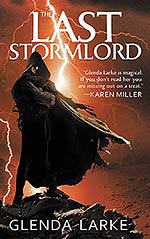
![]() Nymeria
Nymeria
11/22/2015
![]()
Water is indeed the element at the core of this book: the Quartern, the hot and arid part of the world where the story unfolds, suffers from a chronic lack of water that is supplied only through the action of stormlords, who are able to gather water vapor from the sea and channel it into rains that are stored in vast cisterns. When the novel starts, only one stormlord survives and he's old and ailing, aware that the rainlords' lesser ability to manipulate water will not be enough to ensure survival, even with enforced rationing or the extreme measure of condemning part of the populace to die of thirst so that the rest can go on.
When I started reading The Last Stormlord I suspected that the comparison with Dune would be inevitable, but I discovered to my delight that the differences are more numerous than the points of contact: in Herbert's novel the lack of moisture is only one of the many features of the world, and even if it shapes the planet's inhabitants' attitude toward water, it's never a key feature of the story. Here, though, water is at the center of everything: mindset, customs, even language are influenced by it - water is the first and foremost thought for everyone, and it takes center stage in both the story and everyone's awareness, winning its own place as a fully fleshed character. Water, and the quantity allotted to any specific individual, is what rules social dynamics and status: to be born waterless - because one's parents are destitute or lost whatever privileges they might have held - is to be condemned to a hand-to-mouth existence, constantly foraging for water, or stealing it at great risk.
The social issues stemming from water - and the impending disaster due to the last stormlord's inability to supply constant rains - are nothing short of fascinating: we see cities organized in descending levels according to access to water, with the lower ones inhabited by the poor and waterless who try to survive by stealing or by selling their bodies or those of their offspring in exchange for some precious moisture. We see the outlying settlements where lack of water is even more dramatic than in the cities, and where the same tiered social structure is reproduced with even crueler results. We witness the ruling body's moral struggles as they realize extreme measures will need to be called into action, and we hear the opposing arguments about the survival of a few against the death of all - and the need to decide who those lucky few will be. The situation further escalates when the desert's nomadic tribes unite - more or less willingly - under a new, ruthless leader who seizes the diminished rainfalls as an opportunity to break an already uneasy truce.
All of the above makes for an absorbing reading, the sense of impending doom compounded by the political maneuvering and the growing awareness that some of the causes of the present situation - like the death of many potential stormlords in the past - might not simply be the result of unfortunate circumstances. On this detailed and very believable background moves a number of characters that gives a choral approach to the narration, even though two of them are more developed than others: Terelle, who has been sold as a child to a snuggery and refuses to accept her destiny as a courtesan; and Shale, eking out his life in a desert settlement while trying to hide his high sensitivity to water. Their individual journeys mirror the decline of the society they live in, while influencing in varying degrees the course of events.
If this world took immediate hold of my imagination, the characters required something of an effort: first, it felt as if - at least in the beginning - too much time was spent with each of them individually, somewhat slowing the overall pace. It's of course a matter of personal preference, but I had the impression that the beginning of the novel dragged on a little before finding its stride. There is also a great deal of exposition that relays necessary information, but is unfortunately delivered in such a way as to impair the narrative flow: while I understand the need to lay some groundwork for a better understanding of a given world, the danger of telling instead of showing is always one that lurks in the shadows and often reduces the characters to mouthpieces rather than creatures who need to grow in depth and facets.
Shale avoids this destiny, though, being a very relatable character: despite the expected journey from obscure nobody to powerful player, he still retains much of his old self, and the constant shifts in perception he's forced to suffer endeared him to me quite easily. His bitter awareness of being a pawn in a game he struggles to understand, the constant betrayals he faces, harden him in a way that's quite realistic: he's as far from the "farm boy turned hero" trope as possible, making him poignantly aware of his own shortcomings and preventing him from falling into any of the genre's clichés. True, the fate of his world does rest on his shoulders but he's unable to bear it completely or to summon the necessary faith in himself to do so - which makes him very, very human.
Since this first book in the trilogy closes on a major cliffhanger, I've come to realize its job was to pave the way for the events that will follow: for this reason I feel inclined to "forgive" its less appealing elements and look forward to the continuation of the story.
http://spaceandsorcery.wordpress.com